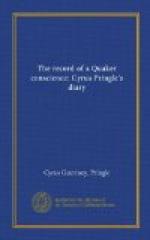These requirements being so much less objectionable than we had feared, we felt relief, and consented to them. I.N. went with us himself to the Surgeon General’s office, where he procured peculiar favours for us: that we should be sent to a hospital in the city, where he could see us often; and that orders should be given that nothing should interfere with our comfort, or our enjoyment of our consciences.
Thence we were sent to Medical Purveyor Abbot, who assigned us to the best hospital in the city, the Douglas Hospital.
The next day after our coming here Isaac Newton and James Austin came to add to our number E.W.H. and C.L.A., so now there are five of us instead of three. We are pleasantly situated in a room by ourselves in the upper or fourth story, and are enjoying our advantages of good quarters and tolerable food as no one can except he has been deprived of them.
[10th month] 8th.—Today we have a pass to go out to see the city.
9th.—We all went, thinking to do the whole city in a day, but before the time of our passes expired, we were glad to drag ourselves back to the rest and quiet of D.H. During the day we called upon our friend I.N. in the Patent Office. When he came to see us on the 7th, he stated he had called upon the President that afternoon to request him to release us and let us go home to our friends. The President promised to consider it over-night. Accordingly yesterday morning, as I.N. told us, he waited upon him again. He found there a woman in the greatest distress. Her son, only a boy of fifteen years and four months, having been enticed into the Army, had deserted and been sentenced to be shot the next day. As the clerks were telling her, the President was in the War Office and could not be seen, nor did they think he could attend to her case that day. I.N. found her almost wild with grief. “Do not despair, my good woman,” said he, “I guess the President can be seen after a bit.” He soon presented her case to the President, who exclaimed at once, “That must not be, I must look into that case, before they shoot that boy”; and telegraphed at once to have the order suspended.
I.N. judged it was not a fit time to urge our case. We feel we can afford to wait, that a life may be saved. But we long for release. We do not feel easy to remain here.
11th.—Today we attended meeting held in the house of a Friend, Asa Arnold, living near here. There were but four persons beside ourselves. E.W.H. and C.L.A. showed their copy of the charges about to have been preferred against them in court-martial before they left their regiment, to a lawyer who attended the meeting. He laughed at the Specification of Mutiny, declaring such a charge could not have been lawfully sustained against them.




